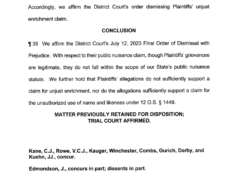
Separate is not equal regarding workers’ compensation plans, the Oklahoma Supreme Court ruled Tuesday afternoon in a 7-2 decision being hailed from competing voices as either a victory for workers’ rights or an example of judicial activism.
The case, Vasquez v. Dillard’s, involved a department store employee who had her injury claim denied by Dillard’s owing to a “pre-existing injury.” A 2013 rewrite of Oklahoma Workers’ Compensation laws allowed companies like Dillard’s to opt out of the state’s workers’ comp plan and offer its own. That plan did not cover injuries related to pre-existing conditions, while the state plan does.
Jonnie Vasquez, the employee, challenged Dillard’s denial, and ultimately the Oklahoma Workers’ Compensation Commission ruled that the opt-out portion of the 2013 law was unconstitutional.
Tuesday, seven of nine Oklahoma Supreme Court justices agreed.
The Oklahoma State Chamber of Commerce did not, issuing a statement through Chamber vice president of government affairs Jonathan Buxton that was heavy on metaphor:
Once again the Oklahoma Supreme Court has shown disdain for the legislative process by legislating from the bench. Today’s ruling that the Oklahoma Option is (an) unconstitutional ‘special law’ shows a lack of understanding of the reason for that article in the constitution — and a willingness to use that provision as a ‘hammer’ to pound any legislative ‘nail’ it doesn’t like.
The court cited the Oklahoma Constitution’s Article 5, Section 59, which reads in full, “Laws of a general nature shall have a uniform operation throughout the State, and where a general law can be made applicable, no special law shall be enacted.”
In the majority opinion, Justice Joseph Watt wrote:
The Opt Out Act does not guarantee members of the subject class, all employees, the same rights when a work related injury occurs. Rather, it provides employers the authority to single out their injured employees for inequitable treatment.
In a dissent, Justice James Winchester said neither the Oklahoma Workers Compensation Commission nor the Oklahoma Supreme Court addressed the actual facts of Vasquez’s case:
The validity of Vasquez’s claim was never entertained. Because the Administrative Workers’ Compensation Act also prohibits recovery for preexisting and/or degenerative conditions, 85A O.S.2013 §§ 2(9)(b)(1), 2(9)(b)(6), 36, it appears that both Acts would have denied her claim. Instead of ruling on these narrow, factual grounds, the majority unnecessarily ventures into the constitutionality of the Opt Out Act and improperly strikes it down based upon hypothetical events.
The office of Attorney General Scott Pruitt filed a brief questioning the merits of Vasquez’s claims in front of the court, which is readable here by viewing the document listed on May 23.
Tuesday’s ruling deals a significant blow to Oklahoma’s comp reforms that were highlighted — and questioned regarding fairness and equity — in this expansive ProPublica examination from October 2015.
Meanwhile, on the same day as the court ruling, the Tulsa World published an editorial praising the 2013 comp reforms for helping to reduce costs for the fourth consecutive year.
(Editor’s note: OKC attorney Bob Burke was one of multiple attorneys representing Vasquez in this case. Burke is a NonDoc sponsor associated with the Oklahoma Coalition for Workers Rights advertisement, but he did not reach out to NonDoc regarding the matter. He also did not return an email by time of publication seeking clarification regarding his role in the case.)





















